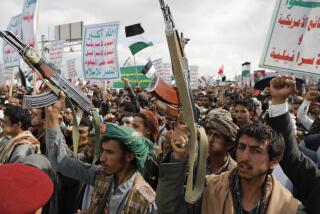Militants said to gain ground in south Yemen
- Share via
Reporting from Sana, Yemen — Hundreds of Yemeni and foreign fighters, including members of an Al Qaeda affiliate, are pouring into a provincial capital after government forces fled in chaos, according to a local official and a fighter who described himself as an Al Qaeda member.
The situation in Zinjibar, capital of the southern coastal province of Abyan, reflects the paralysis in Yemen’s security and political structure as President Ali Abdullah Saleh struggles to remain in power.
Saleh, who has faced months of pro-democracy protests, was wounded last week in a rocket attack by clan rivals and is receiving medical treatment in Saudi Arabia.
The chaos in Yemen has provided an opening for tribal fighters to assert themselves in some parts of the country, and to Al Qaeda in the Arabian Peninsula, a militant group that has targeted the United States.
The head of Zinjibar’s city council, Col. Qasim Muhammed Hadi, said fighters descended from the mountains and entered the city unopposed in late May. Hadi said he alerted local security forces, but neither the army nor police responded.
The Abyan provincial governor also requested help, but found that security commanders had all fled the city, Hadi said.
“Credible local citizens confirmed to me recently that they had seen foreigners with Al Qaeda militants including men of Saudi, Somali and Sudanese nationalities,” said Hadi, who has fled to the city of Aden. He said more fighters were coming, and he feared that the city was becoming a haven for Islamic militants.
An estimated 30,000 people had fled to Aden and nearby Lahj province, he said.
Government units launched airstrikes Wednesday and were shelling the city. Officials said they had killed 30 insurgent fighters Tuesday.
Just days ago, U.S. officials and Western analysts had dismissed the idea that Al Qaeda in the Arabian Peninsula had seized any territory.
A U.S. official briefed on the latest intelligence reports said Wednesday that the militant group had not taken over Abyan province, but “there is a pretty big AQAP presence in Zinjibar.”
“AQAP-affiliated folks have had some success against the Yemeni security forces in that city, and it’s an important city,” the official said. “But they don’t really have the capability to take and hold areas for any length of time.”
The self-described Al Qaeda member, reached by telephone, said seizing Zinjibar was the first step in establishing an Islamic state.
“Youths from almost all parts of Yemen are arriving in Abyan to join in the fight,” said the man, who identified himself as Abed Rabbo Abed. They call themselves Ansar al Sharia, or Supporters of Islamic Law, he said.
The militants claim to control a mountain town north of Zinjibar, and a small stretch of coastal highway leading into the city. “Ansar al Sharia has set up checkpoints through the entire coastal road,” Abed said.
“When I arrived there, I saw all government departments controlled by Ansar al Sharia. They manage all the things there,” he said. The Yemeni military forces appeared demoralized, he said: “They cannot protect even themselves. They are panicked.”
Abed claimed that in one raid, Ansar al Sharia stormed a military base on Abyan province’s western border with Aden, where the fighters stole heavy weapons and equipment, including tanks.
It was unclear whether Saleh withdrew elite British and American-trained counter-terrorism units from the area just before Zinjibar fell because he needed the troops to guard Sana or whether, as some observers argue, he was trying to stoke Western fears by letting Islamic militants grab territory.
“This is a tactic used by the regime in an attempt to blackmail the West for more support,” said Yemeni political activist Abdul Ghani Iryani. “This is a problem that can be dealt with, and once the unrest is resolved, Al Qaeda in the Arabian Peninsula will be rooted out of Yemen.”
Princeton University-based Yemen expert Greg Johnsen said a long period of instability would benefit the militants.
“The longer the political paralysis in the capital and other major urban centers continues in Yemen, the better it is for Al Qaeda in the Arabian Peninsula,” Johnsen said.
The country continued to adjust Wednesday to the absence of Saleh, who has been in power nearly 33 years.
In the southern city of Taizz, armed men roamed the street, claiming to guard antigovernment demonstrators after clashes over the weekend between tribesmen and troops.
In Sana, demonstrators warned that they would form their own interim governing council if Saleh’s vice president did not take steps to hold elections.
Saleh’s supporters say the president will be back soon. However, U.S. officials have said Saleh has suffered severe burns and will need months to recover.
Boone is a special correspondent. Times staff writer Ken Dilanian in Washington and special correspondents Iona Craig and Shuaib M. Al-Mosawa in Sana contributed to this report.
More to Read
Sign up for Essential California
The most important California stories and recommendations in your inbox every morning.
You may occasionally receive promotional content from the Los Angeles Times.










